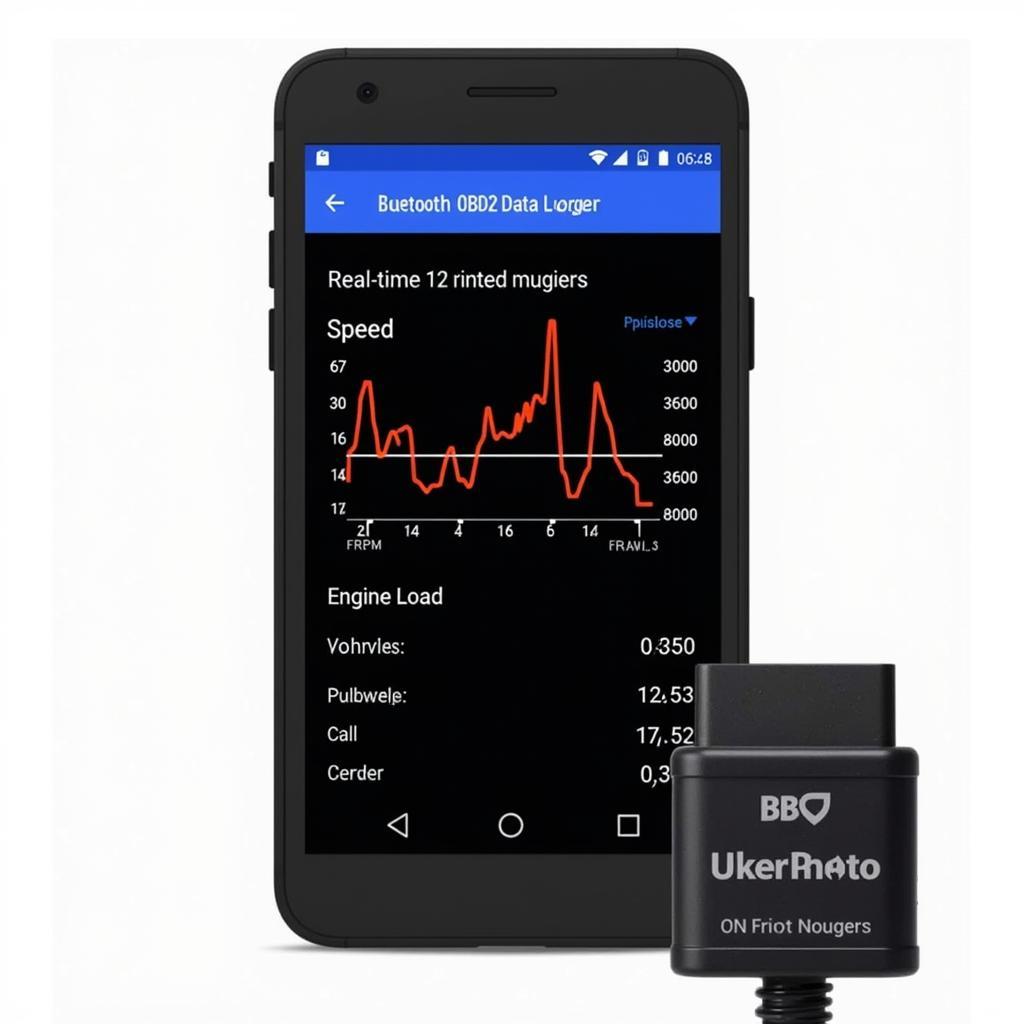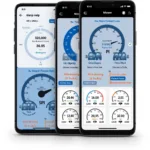An OBD2 data logger is an essential tool for car enthusiasts, mechanics, and anyone who wants to gain deeper insights into their vehicle’s performance. By recording real-time data from your car’s onboard computer, OBD2 data loggers provide a wealth of information that can be used to diagnose problems, improve fuel efficiency, and enhance your overall driving experience.
This comprehensive guide delves into the world of OBD2 data loggers, exploring their functionality, benefits, and the different types available. Whether you’re a seasoned mechanic or a curious car owner, this article equips you with the knowledge to make informed decisions about using OBD2 data loggers for your automotive needs.
How OBD2 Data Loggers Work: Decoding Your Car’s Language
Your car’s engine control unit (ECU) constantly monitors various parameters, such as speed, engine RPM, coolant temperature, and oxygen sensor readings. An OBD2 data logger acts as a bridge between the ECU and you, tapping into this stream of information through the vehicle’s OBD2 port, typically located under the dashboard on the driver’s side.
Once connected, the data logger records the information transmitted from the ECU and stores it for later analysis. This data can be viewed on the logger’s display, downloaded to a computer, or accessed through a dedicated mobile app, depending on the type of data logger used.
Types of OBD2 Data Loggers: Choosing the Right Fit for Your Needs
OBD2 data loggers come in various shapes and sizes, each with its unique features and capabilities. Here’s a breakdown of the most common types:
1. Standalone OBD2 Data Loggers: Compact Powerhouses
These portable devices resemble small handheld scanners and offer a convenient way to collect and analyze vehicle data on the go. Standalone OBD2 data loggers typically feature a built-in display for real-time monitoring and data visualization, and many models offer data logging capabilities even without a constant connection to a smartphone or computer.
2. Bluetooth OBD2 Data Loggers: Wireless Freedom at Your Fingertips
For seamless data access and analysis, Bluetooth OBD2 data loggers pair wirelessly with your smartphone or tablet. By connecting to a dedicated app, these loggers allow you to view live data, record trips, and even diagnose engine trouble codes directly from your mobile device.
 Bluetooth OBD2 Data Logger App Interface
Bluetooth OBD2 Data Logger App Interface
3. WiFi OBD2 Data Loggers: Sharing Data with Ease
Similar to Bluetooth loggers, WiFi OBD2 data loggers offer wireless connectivity but with the added advantage of connecting to your home or mobile WiFi network. This enables remote data access, cloud storage, and even real-time data sharing with mechanics or other enthusiasts.
4. USB OBD2 Data Loggers: Direct Connection to Your Computer
For in-depth data analysis and advanced diagnostics, USB OBD2 data loggers connect directly to your computer via a USB cable. These loggers often come bundled with sophisticated software that provides detailed graphs, charts, and customizable reporting options for comprehensive vehicle performance evaluation.
Why Use an OBD2 Data Logger? Unveiling the Benefits
Investing in an OBD2 data logger offers a plethora of benefits for car owners and enthusiasts alike:
1. Diagnose Engine Problems Like a Pro
One of the most significant advantages of using an OBD2 data logger is its ability to identify engine problems early on. By monitoring vital engine parameters, these loggers can detect anomalies and trigger alerts, allowing you to address potential issues before they escalate into costly repairs.
“Early detection is key to preventing major engine damage,” says automotive expert John Smith. “An OBD2 data logger can be a lifesaver for car owners, providing valuable information that can help avoid expensive repairs down the line.”
2. Enhance Fuel Efficiency and Save Money
Understanding your driving habits and their impact on fuel consumption is crucial for maximizing fuel efficiency. OBD2 data loggers provide insights into your driving style by tracking metrics like acceleration, braking, and idling time. Armed with this information, you can adjust your driving habits to conserve fuel and save money at the pump.
3. Improve Vehicle Performance and Optimize Tuning
For performance enthusiasts, OBD2 data loggers are indispensable tools for optimizing engine tuning and maximizing horsepower. By monitoring parameters like air/fuel ratio, ignition timing, and boost pressure, these loggers enable you to fine-tune your vehicle’s performance and achieve optimal power output.
4. Track and Analyze Trip Data
Whether you’re on a road trip or simply commuting to work, OBD2 data loggers can record and analyze trip data, providing valuable insights into your driving patterns. This information can be used to optimize routes, track fuel consumption, and even monitor driver behavior for fleet management purposes.
5. Clear Check Engine Lights with Confidence
A flashing check engine light can be a source of anxiety for any car owner. OBD2 data loggers not only read and display engine trouble codes but some models also offer code clearing capabilities. This allows you to diagnose and potentially resolve minor issues yourself, saving you a trip to the mechanic.
Choosing the Right OBD2 Data Logger: Factors to Consider
With a wide array of OBD2 data loggers available, selecting the right one for your needs depends on several factors:
1. Features and Functionality
Consider the specific features you require, such as real-time data monitoring, data logging capacity, wireless connectivity options, and software compatibility. Determine whether you need advanced diagnostics, code clearing capabilities, or simply basic data logging functionality.
2. Vehicle Compatibility
Ensure the OBD2 data logger you choose is compatible with your vehicle’s make, model, and year. While most modern vehicles are OBD2 compliant, certain older models or specific car brands may require specialized adapters or software.
3. Ease of Use and Interface
Opt for a data logger with a user-friendly interface and intuitive software that simplifies data analysis and interpretation. Consider factors like display size, button layout, and app design for seamless navigation and data accessibility.
4. Budget and Value for Money
OBD2 data loggers range in price from budget-friendly options to high-end professional-grade devices. Determine your budget and weigh the features offered against the cost to find a logger that provides the best value for your money.
Conclusion: Empowering Yourself with OBD2 Data Loggers
OBD2 data loggers have revolutionized vehicle diagnostics, providing car owners and enthusiasts with unprecedented access to their vehicle’s inner workings. By understanding the different types of data loggers, their benefits, and factors to consider when choosing one, you can unlock a wealth of information to enhance your driving experience, optimize vehicle performance, and potentially save on costly repairs. Whether you’re a DIY mechanic or simply a car enthusiast, an OBD2 data logger is an invaluable tool to have in your automotive arsenal.
